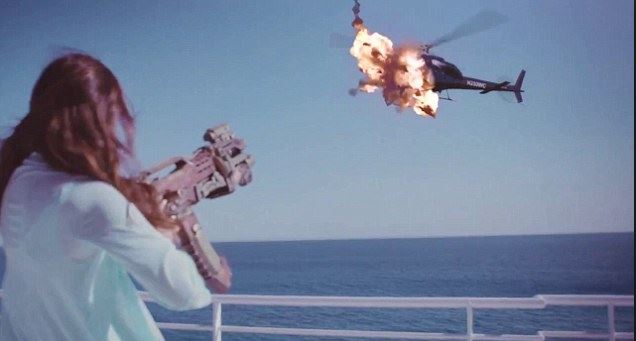I’m reading a book by Benjamin
Percy, called Thrill Me (Essays on
Fiction) and so far it’s, well, thrilling me (thanks for the
recommendation Nicola). Although I own several of his books like Red
Moon and The
Dead Lands in my literally eight-foot tall reading stack (the place
where good books go to be buried until an undisclosed future time when I’ll
actually read them), I haven’t read much of his work (he also writes comics,
too). But, what I’ve read so far in Thrill
Me is really connecting with me on a personal level. Part of this connection
is that I like to read and write horror—and many specific examples in Percy’s
book are about writing by Stephen King, Dean Koontz, and Cormack McCarthy—all
favorites of mine.
But, a particular section of his
book made me light up, and it’s all about this quote: “If a story does not
contain an exploding helicopter, an editor will not publish it, no matter how
pretty its sentences and orgasmic its epiphany may be.” He also goes on to say
“…helicopter is an inclusive term that may refer but is not limited to giant
sharks, robots with laser eyes, pirates, poltergeists, were-kittens….” [Gratuitous helicopter
explosion]
Of course, my book Sunlight (still in second revision,
headed to a third) contains, you guessed it, an exploding helicopter, with lots
of fire, shrieking monsters, and gunfire. Conclusion: There is commercial hope
for my writing yet. I’m also thinking about a were-kitten trilogy, FYI.
In one of my recent grad school writing classes I was assigned the book After Dark by
Haruki Murakami. This book takes place on one evening, between midnight and
seven a.m., and has a sometimes surreal and dreamlike quality. It mostly
focuses on a girl main character (Mari) who hangs out at a Denny’s and gets
involved with some other characters whose world is the night: prostitutes,
Chinese gangsters, young rock musicians, etc. There are a lot of things I liked
about this book: style of prose, commentary and deep thoughts about the human
condition (so intellectually stimulating), likeable characters (my favorite was
a female ex-wrestler), and at times some very cool, surreal moments.
What it didn’t have, for my personal
sensibilities as a reader and writer, was a driving plot or explicit action.
This book had a lot of great things to say, the writing was superb, but specifically there was a plot that I expected (based on the commercial books I
read, the movies I watch) that never unfolded. In the story there is a phone
that belongs to a man who beats up a Chinese prostitute… and other characters
in the book end up with this phone… and there is plenty of danger implied.
Having the phone could be construed (by the Chinese gangsters who manage the
beaten prostitute) as a direct connection to the beating—so in my mind I was
expecting a danger filled plot, where mistaken identity puts the main
character(s) in danger, running for their lives. But that never happened. In
other words, there was no helicopter, and it certainly did not explode.
I guess what I’m really
exploring here is the difference between commercial and literary fiction.
Although I read some literary fiction, and appreciate, admire and strive for
high quality prose writing, my true heart as a reader and writer defaults to
plot-driven (commercial/genre) fiction. I want something to happen, or a bunch
of somethings, something to keep the pages turning for the reader, wondering
what happens next.
One of the inspirations for my
book Sunlight was Cormac McCarthy’s The Road (and it makes me happy when
some of my “test” readers so far have pointed out some similarities to McCarthy's book.) In particular, after reading The
Road—a book I could not put down for how well it was structured, how
beautifully it was written, how suspenseful—I asked “but where were the monsters?” And thus
started my desire to write a similar story, but with monsters brought
prominently forward, where they deserve to be.
For you as a reader, if you had
to choose a book with either: strong, wonderful writing where not much happens--or an exciting, page flipping plot—which
would it be? And do the two have to be exclusive?
For you writers out there, I
ask, does your story have a helicopter crash? A fifty-story tall monster
stomping on military tanks? A kick-ass unicorn battling cave trolls? Maybe it
should.
Mark



2 comments:
I'm contemplating this idea of literary vs. commercial fiction. I've never considered it before, but I think I tend toward the literary novels that delve into characters and their spiritual journey in ways that leave me wondering as a reader why I even liked the book at all. I think it touches on ideas about nostalgia, poignancy, wistfulness, and melancholy. I get to the end of the book and think ... what just happened, I need to read this whole thing again.
One of my favorite books ever was Kafka by the Shore, also by Haruki Murakami.
Melissa, thanks for your comment. I haven't read a lot of Murakami, but in spite of my using After Dark as an example here, I would say I still enjoyed the book and have no regrets about having read it--and I would like to read more work by him. The writing was gorgeous, and I did care about the characters--I just wanted MORE to be happening--which is probably my personal preference (genre over literary) at work.
Post a Comment